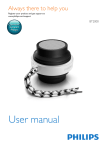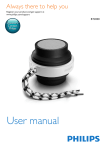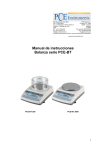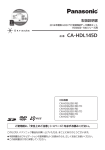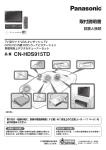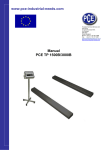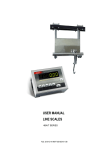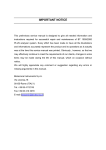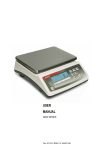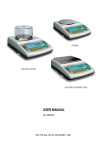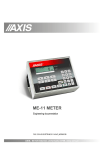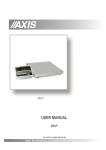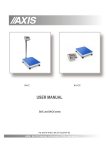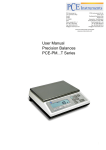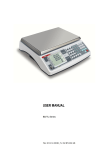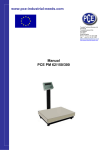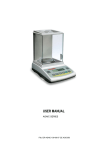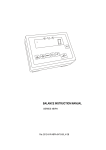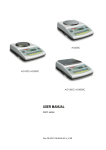Download Declaration of Conformity
Transcript
www.pce-industrial-needs.com Tursdale Technical Services Ltd Unit N12B Tursdale Business Park Co. Durham DH6 5PG United Kingdom Phone: +44 ( 0 ) 191 377 3398 Fax: +44 ( 0 ) 191 377 3357 [email protected] http://www.industrial-needs.com/ Manual Scale PCE-BT 200 / 2000 [email protected] 1. Introduction Electrical balance BT series are designed for use in laboratories and many others technical applications, where high measurements precision is not required. All balances are metrologically tested by manufacturer and they are not designed for calibration certificate. According to order, balances may be calibrated. Balances classification (PKWiU code) 33.20.31. 2. Completation Basic set includes: 1. Balance, 2. Pan cover with lid (5 parts), 3. Power supply unit, 4. Accumulators – 6 units (option) 5. Decorating button (option) 6. Instruction manual. 7. Warranty. 3. Security rules To avoid electrical shock or damage of the balance or connected peripheral devices, it is necessary to follow the security rules below. • All repairs and necessary regulations can be made by authorised personnel only. • To avoid fire risk use a feeder of an appropriate type (supplied with the balance). Pay attention that supply voltage is compatible with specified technical data. • Do not use the balance when its cover is opened. • Do not use the balance in explosive conditions. • Do not use the balance in high humidity. • If the balance seems not to operate properly, unplug it from the mains and do not use until checked by authorised service. According to legal regulations it if forbidden to dispose electronic equipment in waste containers. • Please return wasted balance to the point of purchase or other company specialised in recycling of wasted electronic components. 2 [email protected] 4. Technical data Model of scale BT200 Capacity (Max) Reading unit (d) Linearity Repeatablity Pan dimension Working temperature Weighing time Scale dimensions Scale weight Power supply Accumulators Working time with 1000mAh batteries 200g 0,001g 0,003g 0,003g φ115mm BT2000 2000g 0,01g 0,03g 0,03g 145x125mm +18°C ÷ +33°C <3s 175x245x80mm 1kg =12V 160mA NIMH R3 ( AAA size) – 6pcs ~6 h (back light on) ~16h (back light off) 3 (bAttEry function) > 5 min (AutoOFF function) > 30 s (b_LIGHt function) F2 200g F2 2000g Batteries charge indicator Automatic shut-off time Automatic back light shut-off time Calibration weight (OIML) 5. General view of balance 9 1 2 1 – pan welt (pan) 2 – carring pan ( under welt) 3 – information windows 4 – LCD display 5 – balance keyboard 6 – rotary legs 7 – level 8 – pan cover (complex) 9 – keyboard cover 10 – protection rod 11 – protection cap 12 – decorating button 8 11 5 12 10 6 4 7 9 1 2 8 3 5 1 – pan welt (Pan) 2 – carring pan (under welt) 3 – information windows 4 – LCD display 5 – balance keyboard 6 – rotary legs 7 – level 8 – Pan cover (complex) 9 – keyboard cover 6 4 7 3 [email protected] Connections views: Feeder ~230V Feeder RS232C RxD (receiver) TxD (transmitter) masa 1 2 3 4 5 6 7 8 9 4 [email protected] 6. Keys and indicators Max d= Keys functions description: key key key key key I/ MENU →T← → 0← indicator bar indicator indicator Max, d OFF - switch-on/switch-off (standby), - numeric key / menu, - tare (subtract package weight from weighed mass) - numeric key / data output (print / transmission), - numeric key / zeroing (balances for direct sale use only), - result stabilisation, - load indicator 0 ÷ 100%, - stand-by mode, - metrological parameters Additional functions of keys: → 0← - Next digit, Decimal point, →T← - Next position, MENU - end. 7. Workplace preparation for balance Balance workplace should be choice carefully in order to reduce influence of factors, that could disturb balance operation. The workplace should assure appropriate work temperature of balance and necessary space for normal balance operation. The balance should stand on stable table that is made of material non–affecting magnetic on balance. Sudden motion of air, vibration, dustiness, violent changes of temperature and humidity above 90% are forbidden. The balance should stay away from heat sources and devices that emit strong electromagnetic radiation and magnetic field. 5 [email protected] +33°C +18°C 8. Balance preparation for work 9 1 2 1. Remove balance and power supply unit from the package. 2. Place the balance on stable foundation, in place not subjected to mechanical vibrations and air movements. 8 11 5 12 3. Unscrew protection rod 10 and take it out with protection cap 11 (if it appears in scale). Into the same place push decorating button 12. 4. Adjust the balance level, using the rotary legs, so the air bubble in the level 7 located in rear part of balance, takes the central position. 10 6 5. Connect together walls edges of pan cover 8. 4 7 6. Put pan cover on balance and cover the lid 9. 6 [email protected] Attention: Pos. 10 and 11 are optional. If balance was moved from environment with lower temperature to the room with higher temperature, condensate can be formed on the surface of balance. In this situation it is forbidden to turn balance on, because balance can be damaged. Before turning on balance, it should stay in a new environment for 4 hours in order to acclimatization. 9. General principles regarding balance operation 1. During balance operation, in order to confirm its efficiency, it is recommended to check the weighing precision by putting a object of exactly known weight before and after series of measurements. In case of allowable measurement error exceeding it is recommend to make calibration by standard weight or contact authorized Service Company to perform balance adjustment. 2. Weighed mass should be placed in the pan centre. 3. The balance enables tare setting in the whole measuring range. It is performed by pressing "→T←" key. Tare setting does not widen measurement range. It only subtracts tare weight from the mass, currently placed on the balance. To facilitate the mass control on the pan, and avoid the range exceeding, the balances have the load indicator, scaled in 0÷100%. 4. The weighing result should be read during the " " indicator lighting, which indicates the result stabilization. 5. When there is no weighing, but the balance should be ready for operation, it may be switched off by I/ key. It turns balance reading system off and entering into the standby mode that is indicated by OFF. Balance turning on is performed by pressing " I/ " key. 6. In balances with active →0← key (zeroing) before putting weighed mass on the balance, make sure, if zeroing indicator →0← is displayed if the zero indication is not shown, press →0← key and wait for balance zeroing and zero indicator appears. Only then you can put an object on the balance. 7. Balance mechanism is very precision device and sensitive to overload, shocks and impacts. Do not overload the balance over 20% of maximum load. Niedopuszczalne jest naciskanie szalki ręką. Make sure, that pan is secured against accidental stress on the period of transport. 10. Balance operation principles with power supply form accumulator (battery) 1. The balances can be supply from ~230V mains thought power pack delivered with the balance. Moreover accumulators also can be used. They can be placed in box inside balance. It is possible to use normal batteries. In order to exchange accumulators for batteries it is necessary to turn off charging accumulators, by bAttErY function (bAt OFF option ) that is descrapt in the further manual part. 2. To extant work time of accumulators (battery), it is possible to turn off display and next balance automatically. The settings of timer operation is made by b_LIGHT and Auto OFF functions. 7 [email protected] 3. Charging of accumulators is made automatically, when balance is connected to power supply unit (also during weighing) Charged state of accumulators can be checked by auxiliary function bAttErY (bat VoL option) 11. Accumulators (batteries) exchange 11 1. Remove pan lid that shields scale pan. Remove pan cover and put it near the balance. 2. Remove pan welt. Turn around balance and put it on the pan cover. Open cover 11. During turning BT200(D) balance around, assure that balance weight does not lean against the pan. Out of control stress puts on pan could damage mechanical balance 13 3. Remove accumulator box 12 and then put accumulators type AAA inward it. 12 The arrangement method of accumulators in the box. 8 [email protected] 12. Start-up Leave the pan empty, plug the feeder to the mains (~230V/50Hz) and plug the feeder connector to the 12V power socket at the back of the scale The scale proceeds with following start-up actions: C-1 Basic electronic components tests: C1, C-2, ... C-6. C-5 bt... Program version. ------- Zeroing. 0.00g Ready. 13. Connecting the balance to a computer or a printer Balance may send data to the computer or printer through RS232C port. During the operation with computer the balance sends the weighing result after the initiating signal from the computer, key. or pressing To cooperate with balance, the computer must have the program, enabling the balance data receiving and processing. AXIS company offers computer programs for cooperation with balances, available on web pages www.axis.pl : - Test RS232C - program for testing balance serial port (full version), - ProCell – program allowing for balance cooperation with Excel spreadsheet and other Windows applications (demo version). 9 [email protected] Standard transmission parameters: 8bits, 1stop, no parity, 4800bps. To change transmission parameters use "rS-232" function (see further part of the manual). Data transmission protocol description (Long protocol) Computer→Balance: initialising signal S I CR LF (53h 49h 0Dh 0Ah) Balance→Computer: balance indication in the following format (16Bytes) Byte Byte Byte Byte Byte Byte Byte Byte Byte 1 2, 11 and 14 3÷4 5÷9 10 12 13 15 16 - sign or space space digit or space digit, decimal point or space digit k, l, c, p or space g, b, t, c or % CR (0Dh) LF (0Ah) Connection cable WK-1 (balance – computer / 9-pin): BALANS COMPUTER Connection cable WD-1 (balance - KAFKA printer): BALANCE PRINTER KAFKA printer internal switches set-up: SW-1 on SW-2 off SW-3 on SW-4 off SW-5 off SW-6 on SW-7 off SW-8 off 10 [email protected] 14. Basic balance functions In further part of this manual the following graphical symbols will be used for balance functions description. 12g T - put load on the pan - put load of the pan - press a key during indication - forced change - automatic change 14.1 Normal weighing When the pan is empty and indication is different than 0.00 g T zero press →T← key. Weighing result should be read when the indicator " 43.04 g " lights. 14.2 Weighing with tare 23.13 g T The balance is equipped with tare equal to its range. Total amount of tare and net mass can not be exceeded max. Balance range. 0.00 g 63.24 g 11 [email protected] 15. Balance special functions All balances, besides the basic metrological functions: weighing and tare setting, have a set of balance special functions. Basic set of includes the following special functions: - Automatic zeroing function (AutotAt) - pieces counting (PCS), - Convert mass units (UnIt) - Convert percentage (PErCEnt) - Preparation of recipes (rECIPE) - Calibration by standard weight / internal calibration option (CALIbr) - setting of work mode for serial port (rS-232) - charging a battery settings (bAttErY), - bright light settings (b-LIGht) - automatic turning off balance (Auto OFF) - weight indication resolution settings (rES), - Activation of above-mentioned functions (ACtIV) - Return unit to default settings (dEFAULt). Other functions may be available as options for demand (description of all special functions is presented in the separate document). After pressing Menu button, start menu will be displayed. The functions are displayed with the successive numbers: F1-PCS, F2-AutotAr, ect. User may change the menu content by activating or deactivating the available special functions with the Menu update function (ACt). During the special functions switching the display shows the MODE indicator. 15.1 Autozeroing (AutotAr) 0.01g AUtOtAr MENU T When AUtotAr function is activated, a balance automatically keeps zero indication if a pan is empty or if zero indication is acquired by pressing →T← key. To leave the function press MENU key, then with →T← key chose AUtOtAr and AUt oFF . Note: Autozeroing function is activated automatically for 10 min. after switching-on AUt oFF AUt on T AUT 0.00g 12 [email protected] 15.2 Pieces counting function (PCS) 12.05 g T That function allows for counting the identical details, e.g. tablets or buttons, contained in the weighed batch. The measurement takes place in two phases: - first phase – calculation of single detail weight upon the basis of sample of specified number of pieces 5, 10, 20, 50, 100, 200, or 500 detils, 0.00 g - second phase – counting the details in the weighed batch. 5 23.04 g MENU Functions has the following options: - PCS OFF – function deactivation, - PCS on – start preparation of recipes PCS T - PCS ... – use the last written unitary mass. - PCS 5, 10, 20, 50, ect – number of pieces in a batch - PCS SEt – write free number of pices in a batch PCS oFF - PCS MJ – direct write a unitary mass - out – exit without saving PCS on T Notes: 1. It is recommended, that the single detail weight is higher than the balance reading graduation, and the weight of sample, used in the first phase is higher than 100 of reading graduations. 2. Err-PCS massage indicates that pan is empty or when the single detail weight is lower than one reading graduation (user may calculate the pieces, keeping in mind, that it increases the error). 5 T 0 pcs 12 12 pc s 13 [email protected] 15.3 Weighing unit selection (UnIt) Use this function to choose weighing unit: 1.60g MENU UnIt T CArAt 8.00 T - CarAt (1 ct= 0,2 g), - MGrAM (1mg=0,001g), - KGrAM (1kg=1000g), - Pound (1 lb=453,592374g), - Ounce (1oz=28,349523g), - OunCEt (1ozt=31,1034763g), - GrAIn (1gr=0,06479891g) - PennYW (1dwt=1,55517384g), - Gram (1g). The example at the left presents how to set carats as weighing unit. ct 15.4 Percentage weighing (PErCEnt) 100% This function enables to display weighing result as a percentage of a reference sample. 0.00 g A measurement is performed in two phases: - first phase – weighing a reference sample, 19.07 g PErCEnt MENU T - second phase – measuring specific sample as a percentage of the reference sample. Weighing result is displayed in different format, depending on the reference sample weight value. For values of 0÷3,5% of weighing range the format is “100.0”, for values 3,5÷35% it is “100.00” and 35÷100% - “100.00” The function has the following options: PEr oFF - PEr oFF – disables the function, - PEr on – stores current indication as 100% and activates percentage weighing, PEr on 50% 100.00% T - out – exit without change. Note: When the function is activated →T← key function does not change. 50.00% 14 [email protected] 15.5 Weigh summing (rECIPE) 0.00 g MENU This function enables to weigh few ingredients in one container and to display aggregated sum of all ingredients. The function has the following options: rECIPE T -rEC oFF – leave the function and display aggregated sum of all ingredients, -rEC on – activate the function, rEC oFF -rEC Con - return to previous series of weighing, - out – exit without change. rEC on A T Before weighing each ingredient (A, B, C, etc.) remember to tare the balance. o 10.01g B o o To read aggregated sum of all previously weighed components use MENU key, rECIPE and rEC oFF option. 0.00g o 10.02g C T T 0.00g o 10.03g Note: When rECIPE function is active, the sign o is displayed at the left of the display. When rEC oFF option was used, SUM indicator disappears after pressing →T← key. MENU rECIPE T rEC oFF T A+ B+ C 30.06g 15 [email protected] 15.6 Calibration with external weight (CALIb) Calibration with external weight standard in verified balances should be performed in case balance indications exceed permissible error. To calibrate the balance a service centre should use calibration weight as stated in Technical Data table (or of better accuracy). Operations sequence: 0.00g CALIbr MENU T CAL oFF - CAL - Press MENU key to call functions menu and to choose CALIbr with →T← key. Calibration function options: - CAL oFF – turn autocalibration off - CAL on – start calibration with external weight - out – exit without saving Press press →T← to choose CAL on. ... CAL on Klawiszem MENU wywołać pojawiające się kolejno funkcje użytkownika. Wait until zeroing is finished. T When LOAD communicate put a calibration weight on the pan. Wait until calibration process is finished and zero indicated. 0.00g m LOAD m 0.00g 16 [email protected] 15.7 Serial port setting (rS-232) 0.00g The function enables to set the following transmission parameters: MENU - bAud (4800, 9600, ..., 115200) - transmission speed, - bitS (7, 8) - the number of bits in a byte, rS-232 - PArItY (0, 1) - parity control, T - Odd (0, 1) – parity control way, - SendInG - transmission type of result by serial port baud - Stb –transmission after used of button and stabilization of result, T - Stb – transmission after used of button result stabilization, -4800 without Stb – automatic transmission after putting load and result stabilization, -9600 - Cont. – continuous transmission approx. 10 results per second. T Default parameters are underlined. In order to set the required parameters activate rS-232 function, select the proper parameter and press →T← key during displaying of required parameter or option value. baud ... out On the adjacent diagram setting of transmission rate of 9600 bps is shown. Setting of others parameters is analogous. T After setting of appropriate parameters and options exit by selecting out. 0.00g 15.8 Charging a battery settings function (bAttErY), 0.00g bAtterY Functions has the following options: T bAt OFF bAt on 0.00g bAttErY function enables to turn on or off charging a batteries and check charging state during working with power supply unit MENU T - bAt OFF – charging accumulators is turned off (this option is necessary in case of using non-rechargeable batteries - bAt on – charging accumulators is tunr off. Accumulators are charging after turning off balance by I/ key, - bAt VoL – readout of charging accumulators state in % (return to readout of mass by press MENU key) - out – Exit without saving 17 [email protected] Charging non-rechargeable batteries to test can cause damage of balance. 15.9 Display setting function (b_LIGHt) 0.00g The function is used to choose action method of display bright light MENU b_LIGHt T b_L on - b_L OFF – bright light function deactivation, - b_L on – bright light function activation, - b_L ECO – inactiving - b_L bAt – the same as above but only during supply from accumulators. - out – Exit without saving T turn this function after 30 seconds of Turning bright light function off reduces energy consumption that is essential with power supply from accumulators. 0.00g 15.10 Automatic turning off balance (Auto OFF) 0.00g MENU The function turns balance off automatically without any balance activity. It reduces energy consumption and extend working time of balance with power supply from accumulators: Auto OFF T AOF on 0.00g T - AOF OFF – balance will not turn off automatically - AOF on – turn balance off after 5 minutes of inactiving - AOF bAt – the same as above but only during supply from accumulators. - out – Exit without saving 5m in. OFF 18 [email protected] 15.11 Reading unit choosing (rESOLUt) 0.00g rESOLUt MENU This function enables to choose reading unit value (resolution). The function is only available in BT200 and BT2000. T Available reading units: T - wagi BT200: d=0,01g i d=0,001g, - wagi BT2000: d=0,1g i d=0,01g. 0.000g 15.12 Function Menu customisation (ACtIV i dEFAULt) 0.00 ACtIV T This function enables to select special functions that will be displayed after pressing MENU key. Easy access to the most useful functions will shorten operation time and make work more comfortable. To differ ActIV function from the function menu, indicator is displayed at the left side of the display. AUtOtAr It is possible to return to default setting by special function dEFAULt Operation sequence shown on the picture, presents how to add RS232C parameters setting function (rS-232) to the function menu. rS232 T To remove a function from the Function Menu choose rS oFF in the last operation. rS oFF rS on T 19 [email protected] 16. Maintenance and repairs of small defects 1. The balance should be kept clean. 2. Take care that no dirt gets between the casing and the pan. If found any, remove the pan (lift it up), remove dirt and then replace the pan. 3. In case of improper operation caused by short-lasting power supply decay, unplug the balance from the mains and then plug it again after few seconds. 4. To calibrate the balance contact nearest service. 5. It is forbidden to make any repairs by unauthorised persons. 6. To repair the balance, please contact our nearest service. Error communicates: Communicate Possible cause C-1...6 Remedy selftests failed if displayed more than 1 minute, contact an authorised service protection rod remove protection rod and cap pan missing put the pan on mechanical damage contact an authorised service overloading remove the load from the pan mechanical damage contact an authorised service unstable ground vibrations air flows place the balance on a stable ground not affected by mechanical vibrations and airflows appear balance damage contact an authorised service ------ taring in progress as above (over 1 min.) balance doesn’t work L H indicator does not 20 [email protected] Declaration of Conformity We: AXIS Spółka z o.o. 80-125 Gdańsk, ul. Kartuska 375B confirm with all responsibility that BT series balances: BT200, BT200D, BT2000 i BT2000D marked with CE mark comply the following: 1. EN 55022 standard Limits and methods of measurement of radio disturbance characteristics of information technology equipment and IEC 61000-4-3 Electromagnetic compatibility (EMC) - Part 4-3: Testing and measurement techniques - Radiated, radio-frequency, electromagnetic field immunity test, harmonised with the Council Directive 89/336/EEC. Additional information - Conformity evaluation for the Council Directive 89/336/EEC were carried out by Laboratorium Badawcze Oddziału Instytutu Elektrotechniki w Gdańsku. Gdańsk, 23.09.2008 r. Per pro Director of AXIS Ltd: Production Manager Jan Kończak _________________ Signature In this direction will find a vision of the measurement technique: http://www.industrial-needs.com/measuring-instruments.htm NOTE: "This instrument doesn’t have ATEX protection, so it should not be used in potentially explosive atmospheres (powder, flammable gases)." 21





















